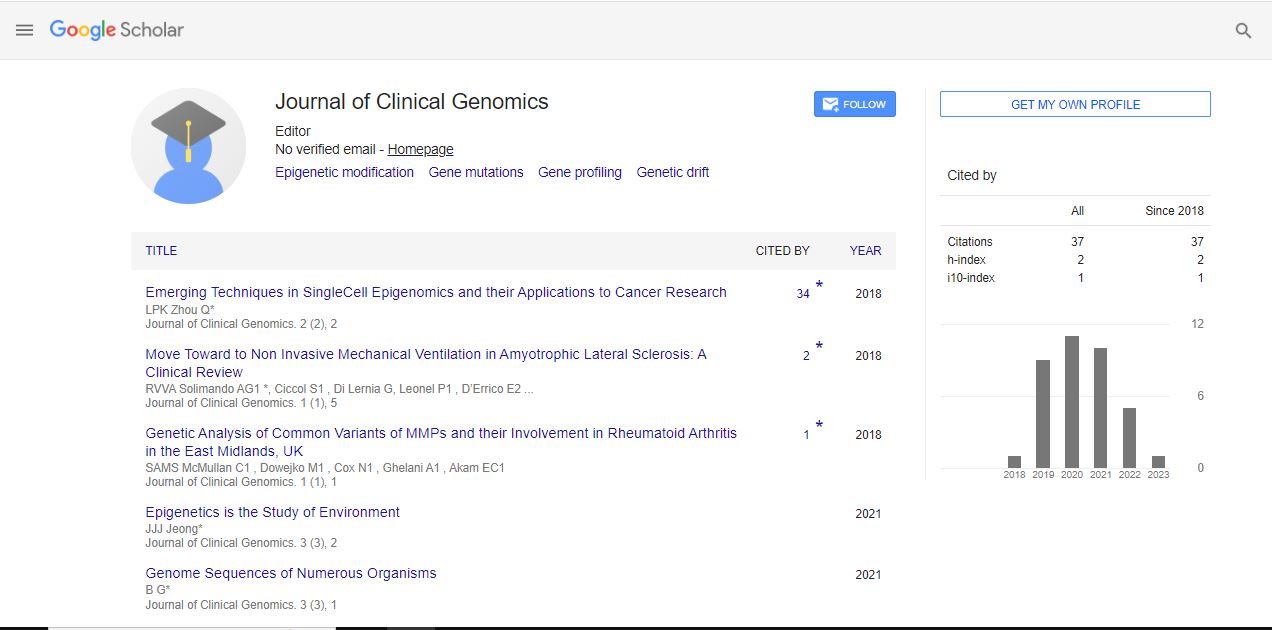Opinion Article, J Chromatography Res Vol: 6 Issue: 2
Evolution of Supercritical Fluid Chromatography and Analytical Methods for Reducing the Liquid and Phase Gas
Vidanarachchi Jonas*
1Department of Chemistry, University of Peradeniya, Peradeniya, Sri Lanka
*Corresponding Author: Vidanarachchi Jonas,
Department of Chemistry,
University of Peradeniya, Peradeniya, Sri Lanka
E-mail: jonas.v@gmail.com
Received date: 02 June, 2023, Manuscript No. JCGR-23-107796;
Editor assigned date: 05 June, 2023, PreQC No. JCGR-23-107796 (PQ);
Reviewed date: 19 June, 2023, QC No. JCGR-23-107796;
Revised date: 26 June, 2023, Manuscript No. JCGR-23-107796 (R);
Published date: 06 July, 2023, DOI: 10.4172/JCGR.1000059.
Citation: Jonas V (2023) Evolution of Supercritical Fluid Chromatography and Analytical Methods for Reducing the Liquid and Phase Gas. J
Chromatography Res 6:2.
Description
Supercritical Fluid Chromatography (SFC) is a modern and effective analytical methodology that combines the principles of both Liquid Chromatography (LC) and Gas Chromatography (GC). SFC employs supercritical fluids, typically Carbon ioxide (CO2), as the mobile phase to facilitate the separation and analysis of various compounds in a sample. This innovative technique provides distinct advantages over traditional chromatographic methods, causing it an increasingly popular choice in pharmaceutical research, natural products analysis, and environmental monitoring.
Principles of supercritical fluid chromatography
The principle of supercritical fluid chromatography is based on the unique properties of supercritical fluids, which exhibit characteristics of both gases and liquids at specific temperatures and pressures. The process involves the following important steps:
Supercritical fluid mobile phase: In SFC, the mobile phase is a supercritical fluid, typically Carbon Dioxide (CO2), which is maintained at temperatures and pressures its significant point. This essential point is the temperature and pressure at which the fluid exists as either a gas or a liquid but contains both properties.
Stationary phase: The stationary phase in SFC can be silica-based or polar-modified to enhance interaction with analyses. Silica columns are the most common due to their widespread use in both LC and SFC.
Sample injection: The sample is introduced into the chromatographic system by using various injection techniques, such as full-loop injection, partial-loop injection, or dynamic flow injection.
Separation mechanism: As the supercritical fluid flows through the column, it interacts with the stationary phase and the sample components. The separation is accomplished based on differences in polarity, molecular weight, and interactions between the analyses and the stationary phase.
Detection: After the column's emission, the separated analytes are detected and quantified using various detectors, such as Ultraviolet (UV), Refractive Index (RI), or Mass Spectrometry (MS).
Advantages of supercritical fluid chromatography
Supercritical Fluid Chromatography provides several distinct advantages over traditional chromatographic methods, including:
Environmentally friendly: The use of supercritical carbon dioxide as the mobile phase reduces and require for toxic and hazardous solvents, creating SFC and sustainable replacement.
High efficiency: SFC exhibits superior efficiency and immediate analysis times compared to conventional liquid chromatography, enabling rapid separations and increased sample quantity.
Enhanced separation: SFC's different solvation characteristics and lower the consistency allow for improved separation of closely related compounds, including stereoisomers and isobaric compounds.
Compatibility with thermally labile compounds: Supercritical carbon dioxide is a moderate solvent that is suitable for the separation of thermally labile compounds that may degrade in traditional GC or HPLC methods.
Versatility: SFC is highly versatile, capable of analyzing a wide range of compounds, from small polar molecules to large non-polar compounds.
Applications of supercritical fluid chromatography
Pharmaceutical investigation: SFC is extensively used in pharmaceutical analysis for the separation and quantification of Active Pharmaceutical Ingredients (APIs), impurities, and chiral compounds. It plays an important role in drug development and quality control.
Natural products analysis: SFC is appropriate for the analysis of complex natural products, such as plant extracts, essential oils, and lipids, due to its superior efficiency and compatibility with thermally labile compounds.
Food and beverage industry: Supercritical fluid chromatography is applied to assess food quality, detect adulterants, and analyze food additives and contaminants.
Environmental analysis: SFC is utilized in environmental monitoring to analyze water, soil, and air samples for pollutants and trace contaminants.
Petrochemical industry: SFC is employed to analyze difficult combinations in the petrochemical industry, contributing to the optimization of refining processes.
Advancements in supercritical fluid chromatography
Over the years, advancements have been made in supercritical fluid chromatography, enhancing its capabilities and performance:
Tandem Supercritical Fluid Chromatography-Mass Spectrometry (SFC-MS): The associatio n of SFC with mass spectrometry provides enhanced sensitivity and selectivity for the identification and quantification of analytes.
Chiral SFC: Chiral SFC is utilized for the enantioselective separation of stereoisomers, producing it essential equipment in the pharmaceutical industry and natural products analysis.
Supercritical fluid extraction: Supercritical Fluid Extraction (SFE) is closely associated to SFC and it is used to extract analytes from solid or semi-solid matrices prior to chromatographic analysis.
Supercritical Fluid Chromatography in Supercritical Fluids (SFC-SCF): In SFC-SCF, the mobile phase is a supercritical fluid other than CO2, such as ethane, propane, or nitrous oxide, providing alternative separation conditions and properties.
 Spanish
Spanish  Chinese
Chinese  Russian
Russian  German
German  French
French  Japanese
Japanese  Portuguese
Portuguese  Hindi
Hindi 